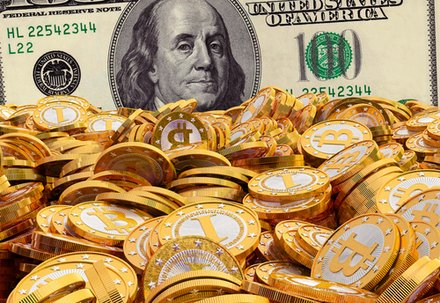Anyone wondering why the Bitcoin price is falling after a nice 45% pop to the $650 range need look no further than the notorious Silk Road website.
 Yes, eight months after the FBI shut down the site - which gained notoriety for letting customers use Bitcoin to purchase illegal drugs - Silk Road is again causing headaches for the Bitcoin community.
Yes, eight months after the FBI shut down the site - which gained notoriety for letting customers use Bitcoin to purchase illegal drugs - Silk Road is again causing headaches for the Bitcoin community.
But what has slammed the Bitcoin price is not a revival of the notorious site, but an announcement yesterday (Thursday) by the U.S. Marshals Service that it would sell 29,656 of the bitcoins it seized from Silk Road in an auction on June 27.
At current prices, those bitcoins are worth about $17.6 million.
Concern over the effect such a large infusion of bitcoins could have on the market triggered a bout of selling, sending the Bitcoin price from $653.71 on Wednesday to as low as $581.82 on Thursday.
The Bitcoin price rebounded past $600 briefly today (Friday), but within hours slid back below $590.
The sudden drop harked back to last October, when news that the U.S. government had shut down Silk Road sent Bitcoin prices down about 20%. That time, however, Bitcoin prices recovered within a couple of days.
One reason the June 27 auction is more worrisome is that it may be just the first of many.
The U.S. government also seized 144,342 bitcoins from Ross Ulbricht, known online as Dread Pirate Roberts. Ulbricht was the founder and chief administrator of Silk Road.
That stash, currently worth about $85.5 million, represents nearly 1.1% of the 12.9 million bitcoins in existence. If the government unloads that batch in one or more auctions, the impact on the Bitcoin markets, at least in the short term, could be extremely disruptive.
At least one member of the Bitcoin community sees a silver lining in the U.S. Marshals Service Bitcoin auction, however.
"The fact that they're going to liquidate them instead of destroy them gives Bitcoin some legitimacy," Gavin Andresen, the chief scientist of the Bitcoin Foundation, told Wired. "They see them as something of value."
Still, a Bitcoin auction carries the risk that the offers could go lower than the current market price.
How the Auction Will Work and Why It's Hurting the Bitcoin Price
Here's how the U.S. Marshals Service Bitcoin auction will work:
The 29,656 bitcoins have been split into nine blocks of 3,000 bitcoins each and one block of 2,656 bitcoins.
And here's some more bad news for most Bitcoin investors not named Winklevoss: To participate in the auction, you need to register no later than June 23 with the U.S. Marshals Service and provide a government-issued ID, a manually signed copy of the bidder registration form, and - gulp - a $200,000 deposit. (Unsuccessful bidders will get the deposit back.)
And you can't put this on your credit card, either.
"The bid must be an all-cash offer," the U.S. Marshals Service said in its announcement. "Bids that are contingent on financing terms of any kind will not be considered. All bids must be made in U.S. dollars."
While the bids could well go above the market price, no one will know until the government publishes the results. And since the winners won't be notified until June 30, the public will have to wait at least that long, and probably several days longer, to learn the results.
That places a cloud of uncertainty over Bitcoin prices for the next few weeks, and possibly much longer if the U.S. Marshals Service starts hinting that it plans to auction off Ulbricht's giant pile of seized bitcoins.
But whatever happens with the Silk Road bitcoins, it's important to remember the effect will be temporary. The forces pushing the Bitcoin economy forward are far more powerful and eventually will drive the Bitcoin price well beyond its previous highs.
Have you taken a position on Bitcoin as an investment? Do you think the Bitcoin price will breach its previous highs? Let us know on Twitter @moneymorning or Facebook.
EDITOR'S NOTE: At first blush, a Bitcoin fund might appear too risky for a retirement account. But many retirement advisors now advocate setting aside up to 10% of a portfolio for "alternative" investments. Here's how a Bitcoin fund could play a role in your retirement planning...
Related Articles:
- Wired:
The Feds Are Auctioning a Small Fortune in Silk Road Bitcoins - U.S. Marshals Service Website:
FOR SALE: 29,656.51306529 bitcoins
About the Author
David Zeiler, Associate Editor for Money Morning at Money Map Press, has been a journalist for more than 35 years, including 18 spent at The Baltimore Sun. He has worked as a writer, editor, and page designer at different times in his career. He's interviewed a number of well-known personalities - ranging from punk rock icon Joey Ramone to Apple Inc. co-founder Steve Wozniak.
Over the course of his journalistic career, Dave has covered many diverse subjects. Since arriving at Money Morning in 2011, he has focused primarily on technology. He's an expert on both Apple and cryptocurrencies. He started writing about Apple for The Sun in the mid-1990s, and had an Apple blog on The Sun's web site from 2007-2009. Dave's been writing about Bitcoin since 2011 - long before most people had even heard of it. He even mined it for a short time.
Dave has a BA in English and Mass Communications from Loyola University Maryland.



